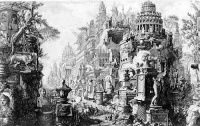Julius Caesar
From The Art and Popular Culture Encyclopedia
| Revision as of 10:04, 29 January 2008 Jahsonic (Talk | contribs) (Julius Caesar moved to Caesar) ← Previous diff |
Revision as of 10:33, 11 October 2011 Jahsonic (Talk | contribs) Next diff → |
||
| Line 1: | Line 1: | ||
| + | [[Image:Antichità Romane.jpg|thumb|right|200px|This page '''{{PAGENAME}}''' is part of the [[Ancient Rome]] series. | ||
| + | <br> | ||
| + | Illustration: [[Piranesi]]'s [[fictitious]] [[Roman Empire|Roman]] ruins.]] | ||
| {{Template}} | {{Template}} | ||
| '''Gaius Julius Caesar''' ([[July 12]] or [[July 13]], [[100 BC]] or [[102 BC]] – [[March 15]], [[44 BC]]), was a [[Roman Republic|Roman]] [[military]] and [[political]] leader and one of the most influential men of World history. He played a critical role in the transformation of the [[Roman Republic]] into the [[Roman Empire]]. | '''Gaius Julius Caesar''' ([[July 12]] or [[July 13]], [[100 BC]] or [[102 BC]] – [[March 15]], [[44 BC]]), was a [[Roman Republic|Roman]] [[military]] and [[political]] leader and one of the most influential men of World history. He played a critical role in the transformation of the [[Roman Republic]] into the [[Roman Empire]]. | ||
| + | |||
| + | ==Literary works== | ||
| + | Caesar was considered during his lifetime to be one of the best orators and authors of prose in Rome—even Cicero spoke highly of Caesar's rhetoric and style. Among his most famous works were his funeral oration for his paternal aunt [[Julia (aunt of Caesar and wife of Marius)|Julia]] and his ''[[Anticato]]'', a document written to blacken [[Cato the Younger|Cato's]] reputation and respond to Cicero's ''Cato'' memorial. [[Poems by Julius Caesar|Poems by Caesar]] are also mentioned in ancient sources. His works other than his war commentaries have been lost, although a few sentences are quoted by other authors. | ||
| + | |||
| + | ===Memoirs=== | ||
| + | * The ''[[Commentarii de Bello Gallico]]'' (''Commentaries on the [[Gallic Wars|Gallic War]]''), campaigns in Gallia and Britannia during his term as [[promagistrates|proconsul]]; and | ||
| + | * The ''[[Commentarii de Bello Civili]]'' (''Commentaries on the [[Caesar's civil war|Civil War]]''), events of the Civil War until immediately after Pompey's death in Egypt. | ||
| + | |||
| + | Other works historically attributed to Caesar, but whose authorship is doubted, are: | ||
| + | * ''[[De Bello Alexandrino]]'' (''On the Alexandrine War''), campaign in Alexandria; | ||
| + | * ''[[De Bello Africo]]'' (''On the African War''), campaigns in North Africa; and | ||
| + | * ''[[De Bello Hispaniensi]]'' (''On the Hispanic War''), campaigns in the Iberian peninsula. | ||
| + | |||
| + | These narratives were written and published on a yearly basis during or just after the actual campaigns, as a sort of "dispatches from the front". Apparently simple and direct in style—to the point that Caesar's ''Commentarii'' are commonly studied by first and second year Latin students—they are in fact highly sophisticated tracts, aimed most particularly at the middle-brow readership of minor aristocrats{{Citation needed|date=January 2010}} in Rome, Italy, and the provinces. | ||
| + | |||
| + | ==Legend and legacy== | ||
| + | In the [[Middle Ages]] Caesar was created a member of the [[Nine Worthies]], a group of heroes encapsulating all the ideal qualities of [[chivalry]]. | ||
| + | |||
| + | |||
| {{GFDL}} | {{GFDL}} | ||
Revision as of 10:33, 11 October 2011

Illustration: Piranesi's fictitious Roman ruins.
|
Related e |
|
Featured: |
Gaius Julius Caesar (July 12 or July 13, 100 BC or 102 BC – March 15, 44 BC), was a Roman military and political leader and one of the most influential men of World history. He played a critical role in the transformation of the Roman Republic into the Roman Empire.
Literary works
Caesar was considered during his lifetime to be one of the best orators and authors of prose in Rome—even Cicero spoke highly of Caesar's rhetoric and style. Among his most famous works were his funeral oration for his paternal aunt Julia and his Anticato, a document written to blacken Cato's reputation and respond to Cicero's Cato memorial. Poems by Caesar are also mentioned in ancient sources. His works other than his war commentaries have been lost, although a few sentences are quoted by other authors.
Memoirs
- The Commentarii de Bello Gallico (Commentaries on the Gallic War), campaigns in Gallia and Britannia during his term as proconsul; and
- The Commentarii de Bello Civili (Commentaries on the Civil War), events of the Civil War until immediately after Pompey's death in Egypt.
Other works historically attributed to Caesar, but whose authorship is doubted, are:
- De Bello Alexandrino (On the Alexandrine War), campaign in Alexandria;
- De Bello Africo (On the African War), campaigns in North Africa; and
- De Bello Hispaniensi (On the Hispanic War), campaigns in the Iberian peninsula.
These narratives were written and published on a yearly basis during or just after the actual campaigns, as a sort of "dispatches from the front". Apparently simple and direct in style—to the point that Caesar's Commentarii are commonly studied by first and second year Latin students—they are in fact highly sophisticated tracts, aimed most particularly at the middle-brow readership of minor aristocratsTemplate:Citation needed in Rome, Italy, and the provinces.
Legend and legacy
In the Middle Ages Caesar was created a member of the Nine Worthies, a group of heroes encapsulating all the ideal qualities of chivalry.

